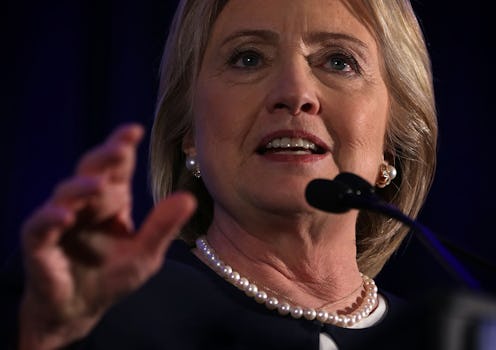News
Clinton's Brutal Letter To Trump
On Monday, GOP presidential candidate Donald Trump suggested in an email statement to the press that the United States ban all Muslims from entering the country. This prompted rivals on both sides of the aisle to react with harsh criticism. While the majority of candidates stuck to posting 140-character responses on their Twitter accounts, Democratic frontrunner Hillary Clinton penned a lengthy letter to Trump on her official campaign site, HillaryClinton.com, taking the critique one step further. While Trump's fellow Republican candidates were busy excoriating him for his extreme views, Clinton pointed out that they seemed to conveniently be forgetting their own radical comments.
"Donald Trump has made a name for himself in this election by trafficking in prejudice and paranoia," Clinton wrote. "[...] But the truth is, many GOP candidates have also said extreme things about Muslims. Their language may be more veiled than Mr. Trump’s, but their ideas aren’t so different." The former Secretary of State then cited specific instances of this, such as Ben Carson's suggestion that a Muslim should not be allowed to become president, and Jeb Bush and Ted Cruz's push to implement a religious test for all incoming Syrian refugees.
Trump's history of anti-Muslim rhetoric has been more crudely framed than that of his competitors. In October, he claimed that he would immediately deport all Syrian refugees if elected president. One month later, he said he agreed that the United States needed to track Muslims, stopping just short of agreeing that there ought to be an official "registry." But Clinton's suggestion that he isn't alone in his ideology isn't too far off-base.
"When you take a step back and see what the Republican field as a whole says about Muslims — not just one or two candidates for President, but nearly all of them — it’s hard to take seriously their attempts to distance themselves from Mr. Trump. He's just articulating the logical conclusion of what the rest of them have been saying."
For example, Marco Rubio, who is considered by the more extreme factions of the Republican Party to be a moderate, has crossed the line a few times, such as when he compared Muslims to Nazis. In a visit to ABC's This Week back in November, Rubio was asked about Clinton's refusal to use the phrase "radical Islam," to which he replied:
That would be like saying we're at war with Nazis [rather than the "Germans"], because we were afraid to offend some Germans who may have been members of the Nazi Party, but weren't violent themselves.
In a similar vein, former frontrunner Ben Carson, who has been sliding in the polls since early November, previously defended his statement that a Muslim shouldn't become president by claiming that the founding fathers wouldn't have trusted them. In an appearance at the National Press Club in early October, he explained:
I’m sure if you had gone to the Founders and said, "But what about this person? They may not be a natural born citizen but you know they’ve been in America for most of their lives, and they’re a fine upstanding citizen, they served in the military, they came back they were on the police force, can’t they be the president?" ... They would have said no. They said "We don’t even want to take the slight chance that we would put someone in that position who had different loyalties."
Republicans have not been alone in their aggressive commentary. Just last month, Roanoke, Virginia mayor David Bowers, a Democrat, released a statement following the gruesome wave of terrorist attacks in Paris, France. He pondered whether the return of internment camps like those in which Japanese-Americans were imprisoned during World War II might be prudent for Syrian refugees (he stopped just shy of using the term "Muslim"). But for all intents and purposes, it seems that Clinton was largely pointing out an uncomfortable truth, rather than simply lambasting her conservative critics in customary partisan style.
While the GOP wants its supporters to focus their anger at Trump, perhaps it would be best for its members to revisit their own statements, and make a few necessary revisions.
